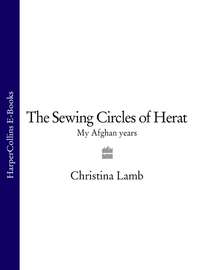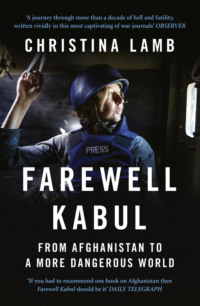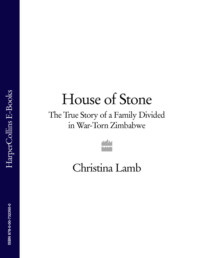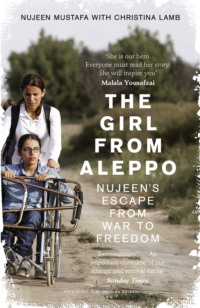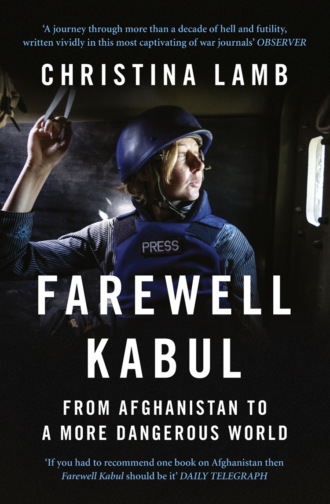
Полная версия
Farewell Kabul: From Afghanistan To A More Dangerous World
‘There are some guests for you,’ said the duty manager.
‘It’s the middle of the night!’ I protested. ‘Tell them to come back in the morning.’
I started walking back to my bed, but the duty manager had the room key, and one of the men in grey snapped the door chain. I was shocked rather than scared. I was in pyjamas, and to have strange men barging into my room in an Islamic country where I had always thought there was respect for women was unbelievable. They snatched my mobile phone, which was charging on the side cabinet, and told me I was going with them.
They let me dress after I protested, then marched me downstairs to reception, where I was made to pay my bill before leaving. I was glad when another group of men appeared holding Justin Sutcliffe, the photographer I was working with. They tried to put us in separate vehicles, but we made so much fuss that they finally bundled us into the same jeep, and we were driven off into the night.
The streets were deserted because of the curfew, and for the first time I felt scared. They could do anything they liked with us, and nobody would know. I was relieved when we turned into a driveway rather than out into the vast Baluch desert. At the end was an abandoned bungalow. Inside, the only furniture was a bed. We were told to sleep while our nine guards sat around and watched. We later discovered this was the old rest-house of Pakistan Railways from colonial times. Fortunately Justin always travelled with spare supplies, and he whispered to me that he had managed to secrete a phone in a pocket. During the night he went to the toilet, from which he called our newspaper while I distracted the guards by pretending to be hysterical. None of our editors answered, as it was the middle of the night back in the UK, but eventually Justin managed to get hold of our Washington correspondent, David Wastell.
The next night our guards drove us to the airport, radioing colleagues with the code ‘The eagle has landed.’ We were put on a flight to Islamabad and handed over to the FIA, another Pakistani intelligence agency, where no one seemed to know who had ordered our arrest or why. The FIA Director was at a loss what to do, as his cells were being rebuilt, so he kindly fed us some of his own curry dinner and put us under guard in the VIP section of the departure lounge. The next day a diplomat came from the British High Commission, who unhelpfully told us the best thing in terms of our security would be if we left Pakistan. We were unceremoniously deported.
The typed expulsion notices were dated 3 November 2001, and signed by Shah Rukh Nusrat, Deputy Secretary to the government of Pakistan. Mine stated: ‘Whereas Miss Christina Lamb, British national acting in manner prejudicial to the external affairs and security of Pakistan it is necessary that she may be externed from Pakistan. Now because in exercise of the powers conferred by section 3 subsection 2 clause C of the Foreigners Act the federal government is pleased to direct that the Miss shall not remain in Pakistan and should leave the country immediately.’
The Pakistani newspapers printed a ludicrous story, fed from ISI, that we had tried to buy a plane ticket in the name of Osama bin Laden. Years later I would still get asked why we had done this.
My relationship with Pakistan had been conflicted since my previous deportation. As we were led onto the PIA plane (having been asked to pay for the ticket, which we refused to do), I vowed I would never go back.
Shortly after take-off, one of the stewardesses came and said the pilot was inviting us into the cockpit. We were astonished. This was less than two months after 9/11, and the world’s airlines had all issued instructions to keep cockpits locked. I pointed out we had been deported as threats to national security, but she just smiled and led us to the front. Inside the cockpit was Captain Johnny Afridi, the plane’s pilot, a Pashtun with John Lennon glasses and a long, skinny ponytail. ‘Don’t worry about those goons,’ he laughed. ‘I’ve been arrested too.’ By the end of a very entertaining flight, sitting in the cockpit for a spectacular sunset landing at Heathrow, my resolve never to return to Pakistan was forgotten.
Back in London we were called into the Foreign Office to meet the head of the consular service. I was furious that they had done nothing to fight our case – we were from one of Britain’s leading newspapers, the Sunday Telegraph, and had been trying to report on a war in which Britain was involved.
‘You must understand Pakistan are our allies,’ we were told. ‘We need their support during the bombing campaign. It’s a very sensitive time.’ We later learned that four Pakistani bases in Sindh and Baluchistan were being used to fly some of the bombing raids.
It was a bright sunny day, but as we walked out into St James’s I blinked back angry tears. It seemed my war was over before it had even started.
Meanwhile, in Afghanistan everything was suddenly happening very quickly. Since the start of November the US had agreed to all the urging from the Northern Alliance commanders, and begun pounding Taliban front lines with giant daisy-cutter bombs dropped from AC-130s. Gary Schroen and his CIA team were monitoring Taliban radio traffic, and could literally hear the fear. ‘Our guys were listening to the radios and the panic, the screaming, the shouting as bunkers down the line were going up from 2,000-pound bombs,’ he said. ‘I mean, they were just simply devastated, and they broke.’
There was no more talk of quagmire. Mazar-i-Sharif fell to Dostum’s men on 10 November. ‘This whole thing might unravel like a cheap suit,’ President Bush told President Putin.
The Taliban quickly realised it was no contest, and by 13 November had fled Kabul, leaving the Northern Alliance to move in. By the beginning of December they were gone from all the major cities apart from their heartland of Kandahar in the south, which they finally abandoned on 7 December. ‘I think everybody was surprised (with the possible exception of [US Defense Secretary] Don Rumsfeld, who would have felt vindicated) at the result of military intervention, which was nasty, brutish and short,’ said Lieutenant General Sir Robert Fry, commandant of the Royal Marines at the time, who went on to be Director of Military Operations at the Ministry of Defence. ‘It was remarkably successful in that there were negligible Western casualties. You had overwhelming Western firepower, loads of CIA playing the Great Game with buckets of money, and a compliant infantry in the shape of the Northern Alliance. All of a sudden they thought they’d found the philosopher’s stone of intervention.’
New technology, like laser-guided bombs, had avoided a major deployment of troops. To overthrow the Taliban the US had put on the ground fewer than five hundred men – 316 special forces and 110 CIA officers. Only four American soldiers and one CIA agent had been killed, and three of those soldiers were killed by their own bomb – in ‘friendly fire’. The whole operation had cost only $3.8 billion. The CIA estimated it had spent $70 million, mostly in bribes to Afghan commanders. President Bush called it one of the biggest ‘bargains’ of all time.
So easy did it seem that on 21 November, while US forces were still fighting the Taliban, Bush had secretly already directed Rumsfeld to begin planning for a war with Iraq. ‘Let’s get started on this and get Tommy Franks looking at what it would take to protect America by removing Saddam Hussein,’ he said.
General Franks, the commander of US Central Command, was sitting in his office at MacDill Air Force Base in Tampa, Florida, working on plans for Afghanistan when he got the phone call from Rumsfeld. ‘Son of a bitch. No rest for the weary,’ is how he recalled his reaction in his memoir. Bob Woodward’s book Plan of Attack has a rather different account. ‘Goddamn, what the fuck are they talking about?’ Franks is reported as saying. ‘They were in the midst of one war, Afghanistan, and now they wanted detailed planning for another?’
Back in London, Justin and I got help from an unexpected source when Iran obliged us with visas to get into Afghanistan from the west. We flew to Tehran, then to the pilgrim town of Mashad near the border, and drove into Herat the day after the Taliban left. We were helped by Ismael Khan, a warlord who looked the part, with his flowing beard and trucks of neatly clad but fearsome gunmen who accompanied him everywhere. I’d first met Ismael when I went to Herat during Russian times, and his resistance was legendary. He had been imprisoned during the Taliban after being betrayed by General Dostum’s men, though he’d managed to escape. Although part of the Northern Alliance he had his own status as ‘the Emir of the West’, and as soon as the Taliban left he took power in his home city.
From Herat we managed to catch the first Ariana flight to Kabul, a nerve-racking experience, as I’d never before been on a plane that had to be jump-started. As we flew awfully close to mountains, the pilot told us the only instrument working was his ‘vision’.
But we made it, and found ourselves in the Mustafa. It had been a complicated journey that in a way felt the culmination of years, not just months. We had hardly any electricity and little food, but we were happy. Wais even got hold of a TV so we could watch BBC World on the occasions when there was electricity.
The challenges ahead were brutally clear. There was destruction everywhere – parts of the city such as Jadi Maiwand, the old carpet bazaar, and the road to Dar ul Aman palace, resembled pictures of Dresden after the bombing of the Second World War. The once sparkling-blue Kabul River was a brown trickle clogged with evil-smelling garbage. I went to visit the Children’s Hospital, where the doctors told me the power often went off in the middle of surgery, so children just died. My own son had been born more than eleven weeks premature two years earlier, and I asked a doctor what would happen to him if he were born in the hospital. The doctor looked at me as if I was mad. ‘He would die of course,’ he said. Afghanistan was the worst place in the world to be a mother or a child.
After I wrote of this in the Sunday Telegraph, generous readers raised money for a generator which the British military agreed to fly out. In what should have been a warning for the future, once it reached the hospital the generator disappeared.
Everyone was promising not to abandon Afghanistan again. It had been a model war, and the plan was for a model construction of democracy. There would be no more ‘ungoverned space’ which terrorists could move into and use as launching pads for attacks. ‘You abandoned us last time and got bitten by a scorpion,’ warned Hamid Gilani, whose father Pir Gilani was one of the seven jihadi leaders who had raised arms against the Russians. ‘If you abandon us this time you’ll get bitten by a cobra.’
We all assumed foreign aid would pour in to turn Afghanistan around – a donors’ conference was scheduled for Tokyo, and there was talk of billions being pledged. Already there were lots of aid agencies moving in. Kabul was the new sexy place to be, and every day more people arrived at the Mustafa, prompting effusive reunions. ‘Hey, I last saw you in East Timor/Kosovo/Bosnia/Sierra Leone …!’ became a common refrain.
There were French lawyers arriving to draw up a constitution. Feminists setting up gender-awareness classes, a women’s bakery and a beauty school for which American beauty editors sent make-up. There would even be estate agents, as so many aid agencies coming in pushed rents sky high. Elections were planned for the following spring. But when I talked to my Afghan friends, nobody mentioned democracy or women’s rights. They wanted security and food and speedy justice.
The West had its swift military success, dismantling the Taliban regime in two months. I don’t think anybody spoke to ordinary Afghans about what they wanted.
3
Making – and Almost Killing – a President
The war that would never end started in a way that it never should. US special forces captain Jason Amerine and his team from the 5th Special Forces Group were eating ‘truly bad pizza’ in Fortuna Pizzeria in the town of Aktogay in Kazakhstan on the evening of 11 September 2001 when his mobile rang. It was Dan Pedigor, the Defence Attaché from the local US Embassy, with startling news. A plane, he said, had flown into the World Trade Center.
Amerine’s reaction was ‘Oh wow.’1 In primary school he’d read a book about air disasters, and had made a diorama of the B25 Mitchell bomber that hit the Empire State Building in thick fog in 1945. He imagined something like that.
They went back to their pizzas, talking animatedly. Many of the men were thinking about home. They were in Kazakhstan to train Kazakhs in small-unit tactics for counter-insurgency, and had just three days left. Amerine was feeling nostalgic. His divorce had come through in June, and at thirty he thought it was also time for a career change. He had dreamed of being in the special forces since he was a teenager in Hawaii and first met a Green Beret, and now he was an experienced captain, leading a team specialising in parachute insertions behind enemy lines. He knew that as an officer you only have so many opportunities to lead men in the field, then you’re on the staff – and he could not imagine doing an office job. With not much going on in the world, he assumed this would be his last deployment.
Then the phone rang again, and turned everything upside down. A second plane had hit the Twin Towers. Amerine knew then that his country was at war: ‘It was OK, it’s an attack, and had to be al Qaeda who were operating out of Afghanistan.’
Shocked by the news, the men went back to their quarters, and called home to check on their families. Amerine and his sergeant talked late into the night about what might happen. He knew the US would go to war in Afghanistan, and had no doubt that they would be part of it.
What had not occurred to him was that they would be stuck. Although they were probably the special forces team nearest to Afghanistan, military bureaucracy meant they had to go back to base in the US to be assigned orders. However, war had come from the skies, and air traffic closed down around the world for almost a week. The men were left waiting in Almaty, the old Kazakh capital, and he tried to distract them with some sightseeing. One day they went to the World War II museum which was full of displays of big battles fought by the Soviet Union that emphasised all the deaths. One of their guides was a former Soviet officer who had served in Afghanistan fighting the US-backed mujaheddin. ‘It is impossible to win in that country,’ he warned them. ‘Don’t trust the Afghans, and just make sure you come back alive.’
It was 20 September when Amerine and his men finally got back to their base of Fort Campbell in Kentucky. He found it ‘surreal’ to see how everything had already changed. The airport was guarded by men with guns, and there was an Apache helicopter gunship patrolling the highway outside the gate.
Several other special forces teams had already been deployed to bases in Central Asia. Amerine’s team practised live firing and basic soldiering skills while they anxiously waited to be assigned a mission. They presumed this would be to link up with Northern Alliance commanders in northern Afghanistan, and destroy al Qaeda safe havens. Finally, on 10 October, three days after the bombing of Afghanistan started, they were sent back to Central Asia. They had been chosen, along with another team, for the next deployment, and were flown to K2 airbase in Uzbekistan, where they waited.
Two teams were sent to northern Afghanistan, and eventually, after two weeks, Amerine was told that his team would be heading to south-eastern Afghanistan to link up with Abdul Haq and help him start an insurgency. Amerine knew little about him, other than that he was one of Afghanistan’s best commanders from the war against the Soviets. However, within a few hours the news came that Abdul Haq had been captured by the Taliban and executed, so they were to ‘stand down’. ‘That kind of put into perspective the kind of risk the teams were taking,’ said Amerine.
The next day they were told they were being sent to join Hamid Karzai. Nobody seemed to know anything about him, other than that he was a Pashtun, and was trying to raise some kind of Southern Alliance. The information they were given did not even include a photograph. Amerine envisaged ‘some grumpy warlord, missing an eye, with a scar on his cheek who spoke no English’. He sent one of his men to the bazaar to buy a ‘really big knife we could give to our warlord, and say, “We’re here to fight with you, here’s a knife.”’
Amerine along with eleven of his Green Berets was flown to the Pakistani airbase Jacobabad, in the southern province of Sindh, which the Americans were secretly using. Karzai and his men were waiting there. They had already been into Afghanistan, but had found themselves woefully ill-equipped. ‘We weren’t prepared at all,’ Karzai later told me. ‘I went in just in a shalwar and vest, and we ended up sleeping on mountains. It was so cold, even curled up. We finally got to Tarin Kowt [capital of Uruzgan], but people told us there were still lots of Taliban and we should go back.’2
Some of the people he met up with betrayed them, and the Taliban came in pursuit. But Karzai got a message out on his CIA phone, and was luckier than Haq – helicopter-borne US Navy Seals flew in to rescue them and take them to Jacobabad.
When Amerine met the less than athletic Karzai, he was astonished. Instead of a warlord, he found an educated and dignified man speaking impeccable English. ‘In some ways his total lack of military experience made it easier,’ said Amerine. ‘I knew immediately there would be no games, no swaggering or posturing – this was someone I’d be able to talk to.’ He left what had become known as ‘the BFK’ (Big F—ing Knife) in his backpack.
Karzai was accompanied by seven or eight tribal leaders who also did not look as if they would be much use on a battlefield. ‘Most were older, they seemed tired and a couple looked kind of frail,’ recalled Amerine. ‘We figured out he had no forces pretty quickly.’ Only one man stood out. ‘There was this guy Bari Gul with an angry scowl on his face the whole time, he looked a real fighter.’
Karzai seemed unfazed by the task ahead, despite what had happened to Abdul Haq and his own narrow escape. He told Amerine he didn’t think they would have to fight at all. ‘He believed we’d pretty well show up in Uruzgan, that the main town of Tarin Kowt would rise up and that would be it, the Taliban would surrender.’ Amerine was less convinced. ‘If it’s peaceful that’s great, but we’ll plan for it to be a lot more difficult,’ he told him.
While we in the media sat in our hotels in Quetta watching the bombing on TV, Amerine, Karzai and their men gathered around a large map of southern Afghanistan every day for a week, drinking endless cups of green tea, and formed a plan.
In Amerine’s eyes the aim was to ‘infiltrate, grow a force, lay siege to Tarin Kowt, then grow a bigger force and slowly make our way to Kandahar and compel the Taliban to surrender, which would be the end of them’.
Their maps were so poor that they didn’t even know there was only one road between Tarin Kowt and Kandahar. Also, Amerine had never actually raised an army anywhere. Nor was he pleased to discover that he was supposed to take Karzai’s CIA handler Casper and four other agents, which would mean he could take fewer of his special forces team than he wanted.
When Karzai asked Amerine about America’s long-term plans for Afghanistan, he had to admit he had no idea.
There was another problem. Amerine’s commander, Colonel John Mulholland, had given orders that they were not to go into Afghanistan unless Karzai had at least three hundred men on the ground. ‘He meant three hundred bright smiling faces greeting us,’ said Amerine. ‘Karzai said there are more than three hundred men, but they won’t gather unless I go in.’ As it was, on the night they chose to infiltrate because the moon would be at its lowest, Amerine couldn’t reach Mulholland on the phone. Mulholland’s deputy told them to go ahead.
They needed to get going. The bombing campaign was having a quicker impact than expected, and by the time they set off on 14 November, Kabul had already fallen. It was around midnight when Karzai and his seven tribal elders, Captain Amerine and his eleven-man team, and the CIA agent Casper and four more spooks, climbed into five heavily armed Black Hawk helicopters which would drop them deeper behind enemy lines than any other Americans. The soldiers were in camouflage, and most sported beards grown over the previous month to help them blend in with the locals, though close up their thickly muscled builds would give them away. Apart from their weapons and personal GPS, each carried a so-called ‘blood chit’ with a message in seven local languages. ‘I am an American and do not speak your language,’ it read. ‘I will not harm you. I bear no malice towards your people.’
The infiltration was a disaster. One of the helicopters was blown off course by all the dust and dropped four of Amerine’s men in the wrong place, which meant the rest had to wait half the night for them to show up. When the weapons and equipment were airdropped, hundreds of Afghans appeared from the mountains and stole everything, including laptops and the SOFLAM for calling in airstrikes. The Americans were taken to a village on a bend in the Helmand River that was not the place for which they had meticulously planned and studied. It was also clear that Karzai had few people.
Even so, Amerine believed the plan could work, because they would build the force bit by bit. He estimated they would need six months to take Tarin Kowt. He had reckoned without the Afghans. After just three days he got a note from Karzai to say that the people of Tarin Kowt had risen up and taken the town from the Taliban. Amerine was flabbergasted. It turned out that the townspeople had heard that Kabul had fallen to the Northern Alliance, so they stormed the palace of the Taliban Governor of Uruzgan, dragged him out and hanged him. They then drove out the remaining Taliban and declared the town free. To Amerine, this was a disaster. The powerbase of the Taliban was the south, and Uruzgan was Mullah Omar’s home province. Amerine was convinced the Taliban leader and his men would not give that up so easily.
Karzai commandeered some local pick-ups and a bus, and they moved into Tarin Kowt that evening and set up headquarters in a compound. Hours later, as they were about to eat dinner, a message came that an enormous Taliban convoy was on its way from Kandahar to retake Tarin Kowt. Eighty vehicles, they were told. Even allowing for Afghan exaggeration, Amerine was worried. ‘Doing the math in my head, that was a lot of guys.’
He asked Karzai to round up all able-bodied men from the town. After half the night Karzai had managed to find only thirty men. They borrowed some vehicles and drove off, having to stop for petrol on the way. Just south of Tarin Kowt they found an ideal vantage spot from which to protect the town, a bluff that overlooked a wide valley through which the Taliban would have to pass. The men positioned themselves along the ridge, some of the Afghans smoking hashish, and Amerine’s radio operator called in air cover. Soon three F18s were hovering high above at around 30,000 feet.
It was not long before one of Amerine’s men spotted something glinting between the hills. It was the Taliban convoy, so long that it looked like an endless snake. Amerine’s radio operator contacted the US pilots overhead and pronounced the vehicles ‘cleared hot’, meaning they could start bombing. The first bomb missed, but the second hit the lead vehicle, turning it to dust and flame. However, when Amerine turned around, his own Afghan fighters were all jumping in their trucks to flee. They had never witnessed American air power before. Without Karzai, who had stayed back in town, Amerine had no translator to explain to them that the airstrikes were theirs, and they should stay.


